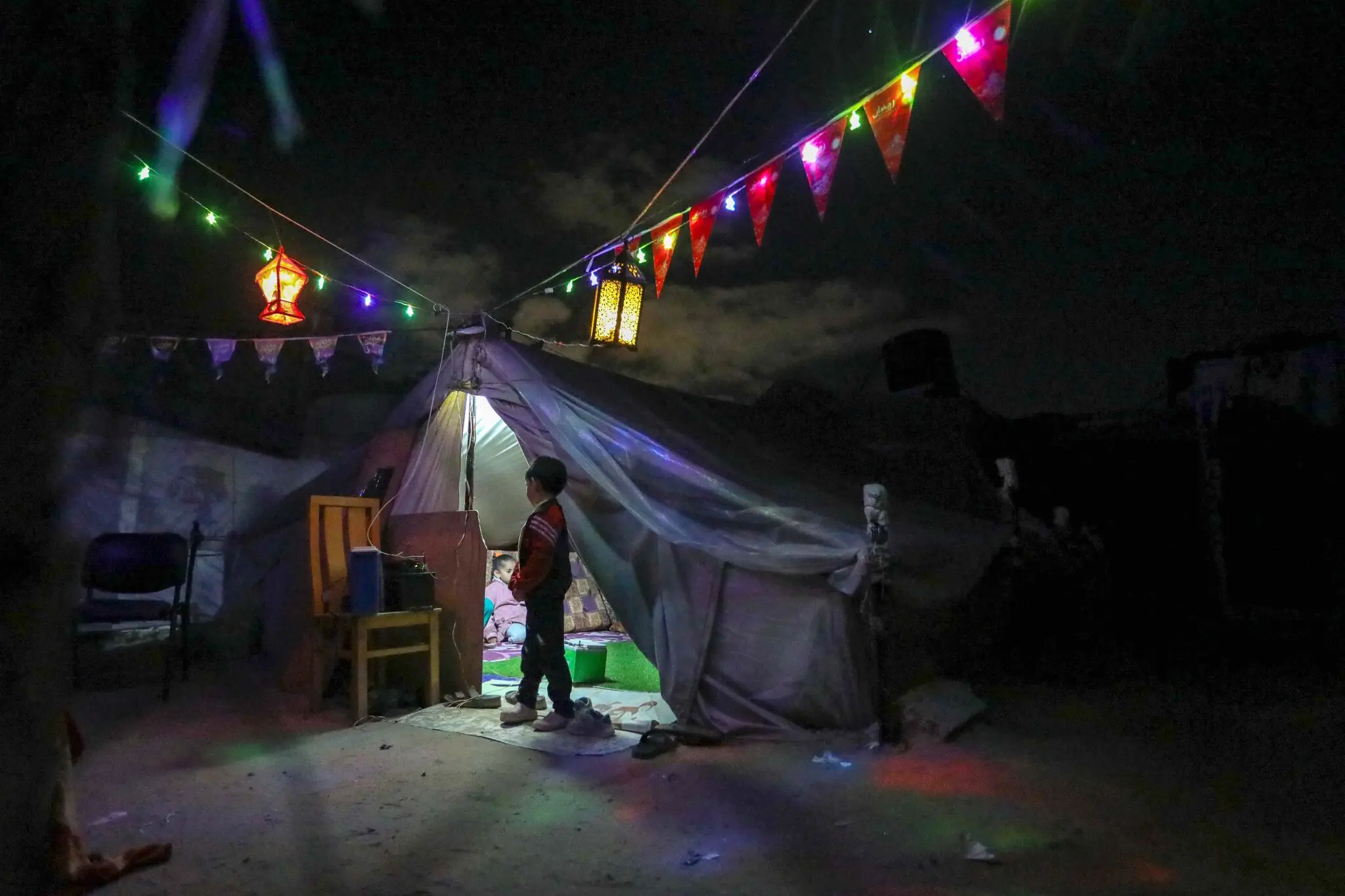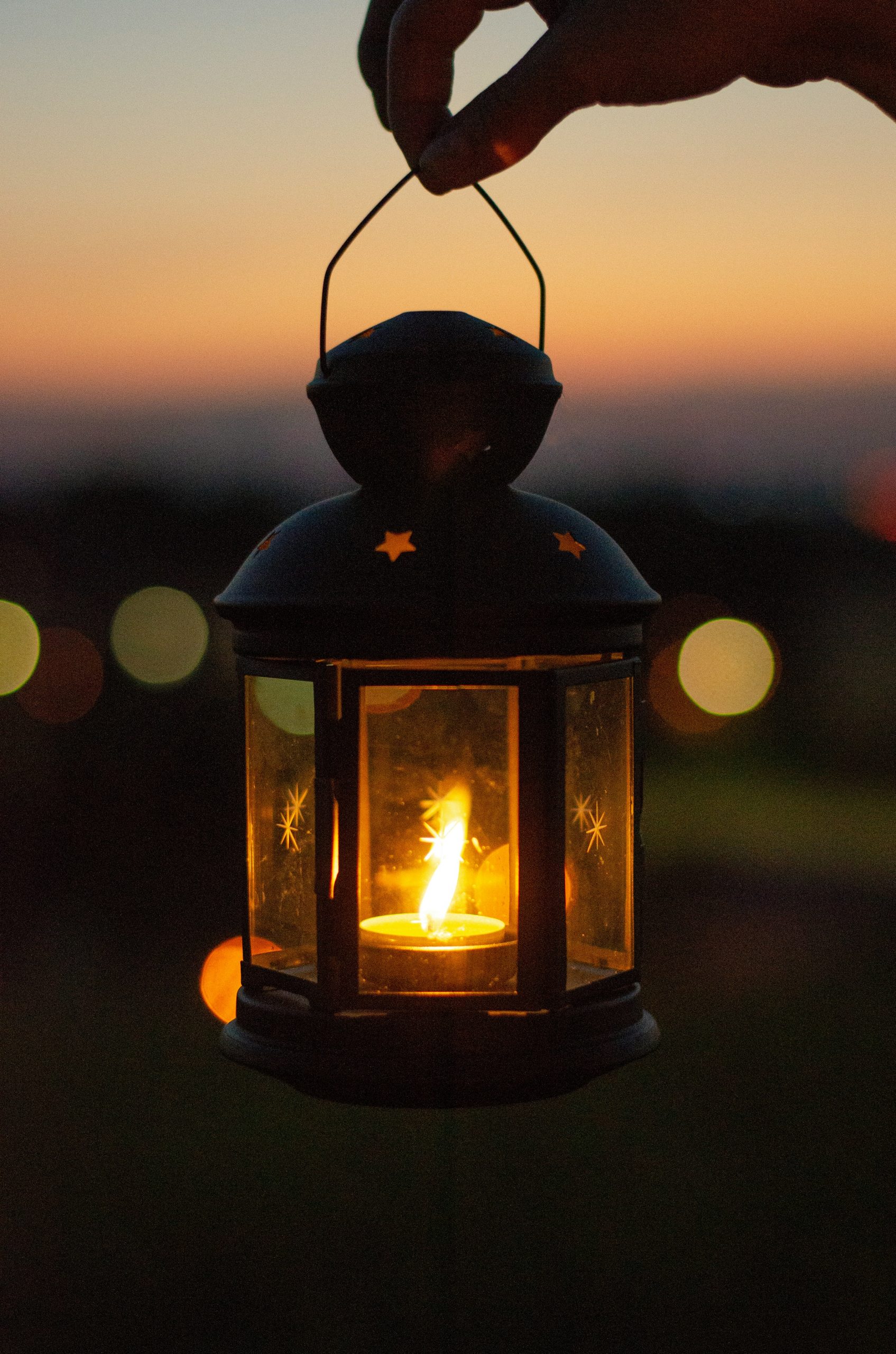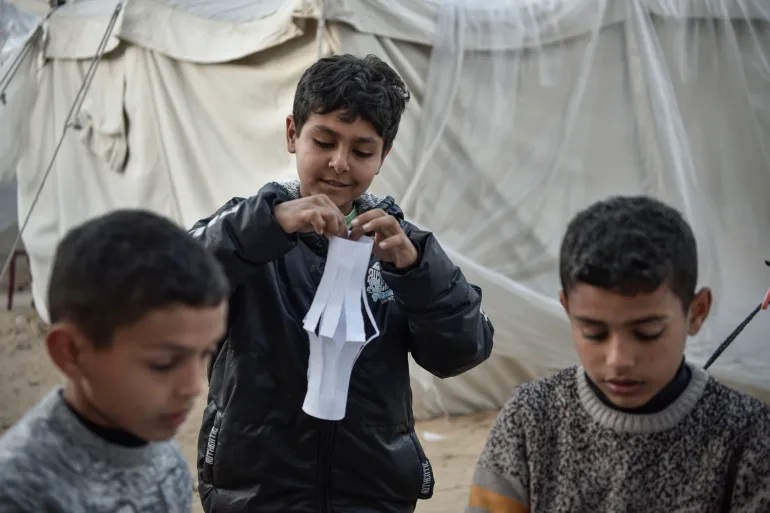#Society
In Light Of A Suffering Ummah Can/Should We Make Ramadan Special In Our Homes?

Published

Many Muslims living privileged lives in the West use Ramadan as an opportunity to reinforce their children’s Islamic identity. We think we should do this by creating a holiday experience that rivals the non-Muslim holidays our children are constantly bombarded with. But many of us are looking at the genocide in Gaza and wondering, what should Ramadan and Eid look like for my family in light of the suffering of thousands of Palestinian children trying to survive?
Some of us are torn when it comes to observing Ramadan with the joy and vivacity of years past. We might feel guilty about what we can give our children while other parents watch their kids starve to death. We might feel incapable of being happy thinking about how much suffering others are enduring. Additionally, some of us may be thinking of how we can center the Palestinian struggle for justice into our observation of Ramadan in a family-friendly way. There are many approaches to Ramadan this year you can take as a family, whether it’s cutting back the extravagance or refocusing attention on Palestine–but now more than ever is the perfect time to remind ourselves that Ramadan is not meant to be a time of joy and excitement. Its true purpose is to build taqwa through increased devotion to Allah 
The Pitfalls of Modeling Ramadan after Christmas and Other Secular Holidays
Living in the West, many of us take the examples of non-Muslim holiday celebrations as the gold standard of what celebrating a holiday should look like. This year in particular provides us all with an opportunity for critical reflection on the materialism and frivolity our cultures inspire.
Keep supporting MuslimMatters for the sake of Allah
Alhamdulillah, we're at over 850 supporters. Help us get to 900 supporters this month. All it takes is a small gift from a reader like you to keep us going, for just $2 / month.
The Prophet (SAW) has taught us the best of deeds are those that done consistently, even if they are small. Click here to support MuslimMatters with a monthly donation of $2 per month. Set it and collect blessings from Allah (swt) for the khayr you're supporting without thinking about it.
Many American holiday celebrations are devoid of true meaning. Most Americans today celebrate religious holidays like Christmas and Easter in secular ways without honoring their religious and moral underpinnings. Thus, many holidays in the West turn into themed parties that drive non-essential spending in the economy. Since the early 2000s, holiday spending has increased every single year in America! Many of us have probably noticed how extravagantly Americans celebrate anything in the last 20 years. Whether it’s Halloween decorations in a neighborhood, elaborate dessert tables at weddings, matching pajama sets for entire families, or simply the increased number of parties during pregnancies (gender reveal party, baby sprinkles)…we are getting more and more extra as the years pass. If we set aside religious holidays and consider celebrations like Halloween, Valentine’s Day, and Independence Day, the materialistic hullabaloo is even clearer.
Now imagine the pressure these cultural norms put on Muslim parents when it comes to Ramadan and Eid! I agree that it is imperative to have our children in the West be excited about their religious identities and want to engage in important religious observations. It is vital to create fun moments and fond memories of Ramadan and Eid so that they have deep emotional connections to their faith which helps buoy their beliefs and self-confidence while living in increasingly diverse societies. That said, we are fighting the wrong battle if all we want to do is recreate the Christmas and Halloween fun with an Islamic spin. Our observations of Ramadan and Eid must fall within Islamic boundaries without compromising our religion’s core principles in favor of adopting mainstream materialistic trends. This is exactly why so many of us feel so confused and conflicted when it comes to celebrating Ramadan and Eid with the swag of years past.
Going Back to the Roots of Ramadan
We must remind ourselves what Ramadan is truly supposed to be about increasing our taqwa through increased worship and devotion to Allah 

“O you who have believed, decreed upon you is fasting as it was decreed upon those before you that you may become righteous -“ [Surah Al-Baqarah: 2;183]
Whatever ways we decide to make Ramadan feel special for our families, the goal of Ramadan should guide all efforts. The hardest things for us to figure out are what aligns with the goal of Ramadan and how we create age-appropriate avenues to allow everyone to grow spiritually.

PC: Sylwia Bartyzel (unsplash)
How we observe Ramadan has changed so much culturally as American Muslims that people from other faiths believe that Ramadan is a holiday as much as Eid is. This is something we have to consider critically. I remember when Ramadan was not considered a month-long celebration to my immigrant parents and our immigrant-dominated masjids. All they wanted to do was make sure the house and masjid were super clean and organized before the holy month started. If we saw balloons or banners in our homes or at the masjid, it was only at Eid and never on the first day of Ramadan. Although I think we can strive for a little less austerity, I think the case for simplification and restraint is strong.
As I mentioned in a previous article from 2019, “To Decorate or Not to Decorate–Is that the Ramadan Question?,” having a goal-oriented approach to making Ramadan feel special for our families can be an act of worship if approached with adequate mindfulness.
“The crux of this issue is simple to me: if we are treating decorating for Ramadan as a voluntary act of worship, what are the conditions that should be met for God to accept this deed? Basic religious principles such as prioritizing obligatory acts of worship over voluntary or simply permissible ones, not violating anyone’s rights or hurting others, etc. should be part of the considerations, as well as practical logistical issues.”
Recommendations for Honoring the Spirit of Ramadan
Here are some recommendations for festive touches that I believe are in line with the goals of Ramadan. They can all be accomplished without much expense or investment of time/energy:
- Anything that teaches or ritualizes the Sunnah, like learning/displaying daily duas
- Try out this simple Fasting Dua Lantern that features a dua you can make at iftar time
- Buy/print out common duas and post them around the home, like dua for going to the restroom, leaving the home, etc.
- Anything that makes engaging in acts of worship easier or more appealing
- Setting up a Quran reading nook with your favorite mushaf on display (without buying a $500 egg chair for HGTV vibes)
- Creating a small musallah in your home or making a modest upgrade to your existing space, like incorporating a new prayer rug storage solution or adding an essential oil diffuser
- Simple decor that makes the home environment feel more special to welcome the blessings of Ramadan
- String lights you can use every year
- A Ramadan banner or sign
There are also activities with an Islamic lesson or good deed at the foundation that you can do with your children. Depending on the age of your children, you may find these activities useful (find details here!):
- Good deed collection jar
- Daily charity birdhouse
- Moon phase garland
What to Avoid this Year
So what should we cut back on, not only this Ramadan but perhaps in the future as well? What have we gone overboard with in our celebrations of Ramadan after being inspired by the worldly cultures we live in?
I think it boils down to splurging on things that don’t bring any true value to our observation of Ramadan and spending too much time or energy on them. Things that come to mind are elaborate designscapes inside or outside of the home, including miniature masjids, backdrops, or lawn decorations. When it comes to looking at what we have already amassed for Ramadan and Eid, we should look at our items and feel content, rather than wanting to add more items to our collections. Stockpiling increasingly amazing items is a disease of materialism that we need to actively fight, even if we have good intentions! We may be supporting Muslim business owners and artists, giving dawah, or instilling the love of Islam in our children, but can we do so with moderation?
Additionally, overly indulgent gift baskets or iftar parties are out this Ramadan. Because wealth is relative, I can only suggest cutting down non-essential spending to half or less compared to previous years’ budgets. This includes how much money we spend on decorations, gifts, and food. Not only that, iftar and Eid parties must be paired back–from decor to goody bags to the amount of food served. Ramadan shows us how little we actually need and how much we should be grateful for everything we have. We must actively fight against the trend of bigger and better every year in our highly materialistic cultures.
Ways to Focus on Palestine this Ramadan
Now we come to the other concern: how do we welcome Ramadan for our families in light of the horrific suffering in Palestine?
The first recommendation is to take the money you would have spent on non-essential items this Ramadan (remember, the goal is to spend less than half compared to previous years) and put that all towards aid to the victims of Israeli (and US-backed) violence. With this strategy, you are not increasing your overall spending but simply increasing the amount you’ve donated. For example, spend $25 instead of $50 on Eid toys and give the rest of it to Palestine. Purchase ordinary dates instead of importing special ones and donate the rest of the money. There are many ways we can cut corners to reduce how much of our budgets go towards our own families this year so that we can divert the remaining funds to others. This practice should be discussed openly as a family and communicated with children to maximize its effectiveness.

Palestinian children make Ramadan lanterns out of paper and hang them in their makeshift tents ahead of the holy month of Ramadan in Rafah, Gaza on March 8, 2024 [Abed Zagout/Anadolu Agency]
Third, honoring the boycott, divestment, and sanctions (BDS) movement in all of our purchases. Avoiding Starbucks when grabbing a coffee for taraweeh or planning ahead to not rely on last-minute Amazon Prime deliveries or purchasing ethically-made clothing for Eid that does not utilize forced Uyghur labor can go a long way. The obvious companies to boycott are Israeli ones or ones that profit Israel in any way, but our concern should extend to the oppressed throughout the ummah.
Fourth, making it part of the family’s spiritual practice to advocate for justice daily. This includes ritualizing calling elected officials as part of the daily wird the family keeps. Take turns calling, especially since you may call on behalf of family members in addition to yourself. Also, find a way to share factual information about the ongoing suffering in productive ways–whether it is strategically sharing news stories on social media or talking to friends and colleagues about the ongoing crisis.
Fifth, find ways to support Palestinian or pro-Palestinian businesses this Ramadan. Can you get take-out from a Palestinian restaurant one week? Can you purchase Eid gifts this year from a company based in Palestine, or with a CEO who openly advocates for the Palestinian cause?
Lastly, I have seen discussions about trying to honor Palestinian culture this year–whether it’s cooking a Palestinian dish or wearing Palestinian clothing. Since I am not Palestinian, I cannot speak to when these actions may cross over to cultural appropriation, which is a crime Israel is very guilty of. The balance between loving our fellow Muslims for the sake of Allah 
Observing Ramadan with a Backdrop of Pain
Once these adjustments have been made, I believe that we will be able to feel the spirit of Ramadan and Eid while acknowledging the suffering of others. Focusing on the true meaning of Ramadan will help us to make room for all of the emotions and realities we and others in the ummah are facing.
May Allah 
Keep supporting MuslimMatters for the sake of Allah
Alhamdulillah, we're at over 850 supporters. Help us get to 900 supporters this month. All it takes is a small gift from a reader like you to keep us going, for just $2 / month.
The Prophet (SAW) has taught us the best of deeds are those that done consistently, even if they are small. Click here to support MuslimMatters with a monthly donation of $2 per month. Set it and collect blessings from Allah (swt) for the khayr you're supporting without thinking about it.
Meena is a writer, podcaster, high school English teacher, wife, and new mom. She loves working with Muslim youth and is interested in literature, arts, and culture. She studied Comparative Literature and Creative Writing at the University of California, Irvine and has a Master’s in Education from the University of Illinois at Urbana-Champaign. She briefly dabbled in Classical Arabic studies in the US and is also studying the Asharah Qira'aat/10 Recitations. Check out her podcast and website Brown Teacher Reads: the brown literature circle you always wanted to be in. (brownteacherreads.com)

You may like

Faith, Identity, And Resistance Among Black Muslim Students

Moonshot [Part 12] – November Evans

From The Prophets To Karbala: The Timeless Lessons Of Ashura For Muslims Today

Moonshot [Part 11] – The Fig Factory

Nationalism And Its Kurdish Discontents [Part II of II]: Kurds And Turkiye After Ottoman Rule

Moonshot [Part 11] – The Fig Factory

Moonshot [Part 12] – November Evans

Moonshot [Part 10] – The Marco Polo

Moonshot [Part 9] – A Religion For Real Life

Genocidal Israel Escalates With Assault On Iran

[Dhul Hijjah Series] Calling Upon the Divine: The Art of Du’a (Part 1)

IOK Ramadan 2025: Four Steps | Sh Zaid Khan

IOK Ramadan 2025: Do Your Best | Sh Zaid Khan

IOK Ramadan 2025: Giving Preference to Others | Sh Zaid Khan

